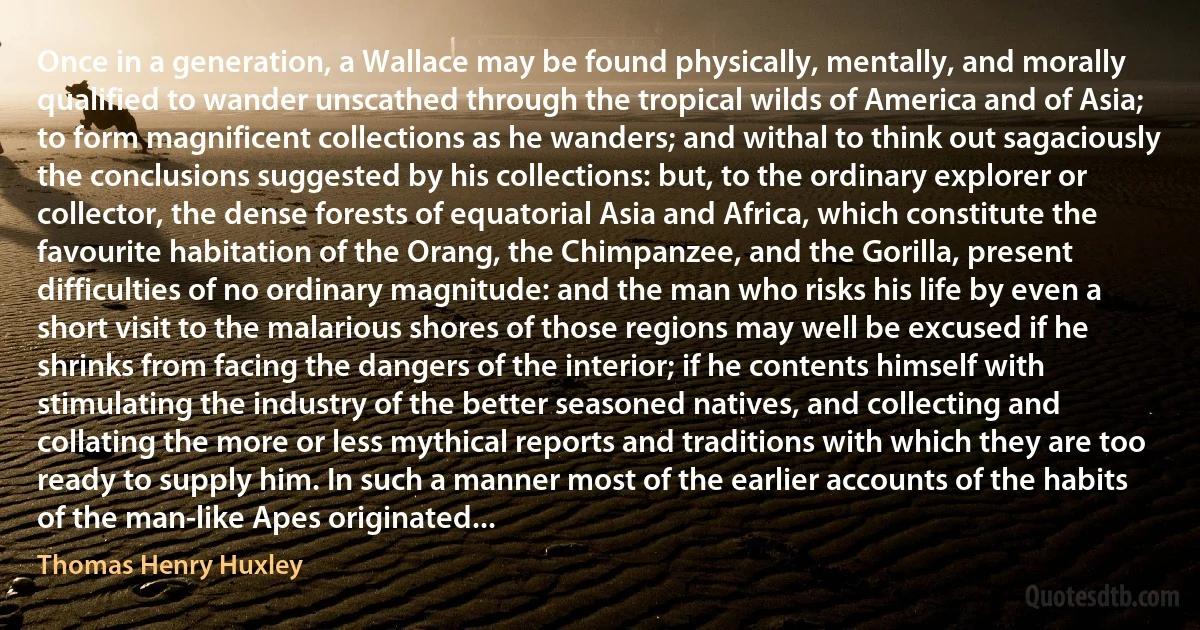
Once in a generation, a Wallace may be found physically, mentally, and morally qualified to wander unscathed through the tropical wilds of America and of Asia; to form magnificent collections as he wanders; and withal to think out sagaciously the conclusions suggested by his collections: but, to the ordinary explorer or collector, the dense forests of equatorial Asia and Africa, which constitute the favourite habitation of the Orang, the Chimpanzee, and the Gorilla, present difficulties of no ordinary magnitude: and the man who risks his life by even a short visit to the malarious shores of those regions may well be excused if he shrinks from facing the dangers of the interior; if he contents himself with stimulating the industry of the better seasoned natives, and collecting and collating the more or less mythical reports and traditions with which they are too ready to supply him. In such a manner most of the earlier accounts of the habits of the man-like Apes originated...
Thomas Henry HuxleyRelated topics
chimpanzee difficulties early found form generation habitation industry interior less life magnitude man once present ready short think tropical visit well asiaRelated quotes
Why should we put up with the present evils in our society? As opposed to the society we are visualizing, the present one can be described as a diseased one. The evils are there on all levels, international and national, and even within the smaller units such as towns and families. Of course, the disease did not appear like a bolt from the blue, either yesterday, or last year. It is the result of factors that have deep roots and long lives. These consist of privations, discriminations oppressions, bigotries, hatreds, and hostilities; poverty, ignorance, hunger, and illiteracy. Each and all of these have been left to us as ar evil heritage from the past. The fundamental difference between our situation today and that of our forefathers is that now knowledge has enabled us to realize that these evils are neither natural nor inevitable in the same way as we have found that cholera or the bubonic plague are not necessary calamities.

Muhammad Reza Pahlavi
Even in Scandinavia, where social democratic institutions were far more culturally ingrained, membership of the EU-or even just participation in the World Trade Organization and other international agencies-appeared to constrain locally-initiated legislation. In short, social democracy seemed doomed by that same internationalization which its early theorists had so enthusiastically adumbrated as the future of capitalism.
From this perspective, social democracy-like liberalism-was a byproduct of the rise of the European nation-state: a political idea keyed to the social challenges of industrialization in developed societies. Not only was there no ‘socialism' in America, but social democracy as a working compromise between radical goals and liberal traditions lacked widespread support in any other continent. There was no shortage of enthusiasm for revolutionary socialism in much of the non-Western world, but the distinctively European compromise did not export well.

Tony Judt
For, strange as the statement will appear at first sight, modern metaphysics, and to a large extent modern physical science, have been groping for centuries blindly after knowledge which occult philosophy has enjoyed in full measure all the while. Owing to a train of fortunate circumstances, I have come to know that this is the case; I have come into some contact with persons who are heirs of a greater knowledge concerning the mysteries of Nature and humanity than modern culture has yet evolved; and my present wish is to sketch the outlines of this knowledge, to record with exactitude the experimental proofs I have obtained that occult science invest its adepts with a control of natural forces superior to that enjoyed by physicists of the ordinary type, and the grounds there are for bestowing the most respectful consideration on the theories entertained by occult science concerning the constitution and destinies of the human soul.

Alfred Percy Sinnett
Being a beggar, he said, was not his fault, and he refused either to have any compunction about it or to let it trouble him. He was the enemy of society, and quite ready to take to crime if he saw a good opportunity. He refused on principle to be thrifty. In the summer he saved nothing, spending his surplus earnings on drink, as he did not care about women. If he was penniless when winter came on, then society must look after him. He was ready to extract every penny he could from charity, provided that he was not expected to say thank you for it. He avoided religious charities, however, for he said it stuck in his throat to sing hymns for buns. He had various other points of honour; for instance, it was his boast that never in his life, even when starving, had he picked up a cigarette end. He considered himself in a class above the ordinary run of beggars, who, he said, were an abject lot, without even the decency to be ungrateful.

George Orwell
... to put an end to the epidemics, we were forced to burn the bodies of an incalculable number of people who were destroyed by the disease. So we were forced to build crematoria, and on this account they are loosing a bond for us. "He also stated that he punished the culprit if the atrocities occurred in the camps." On the Einsatzgruppen: "The war on the Eastern front made the demands more difficult for our soldiers. A terrible climate, never-ending distances, an enemy population and constantly apparent partisans. Just because it was difficult, the troops prevailed. So they were forced to destroy entire villages if there was resistance and gunfire from such a village. Russians are not ordinary enemies, we can not understand their mentality. In the most desperate situations, they would refuse to capitulate. If, because of these difficulties in the East, the Jewish people suffered large casualties, it must be remembered that the German people also suffered severely."

Heinrich Himmler
